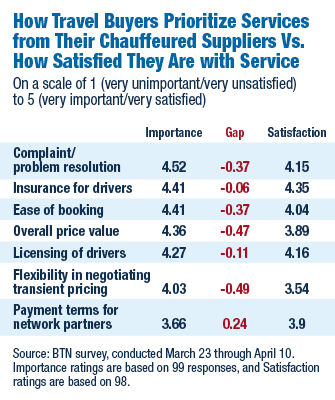
As traditional chauffeured suppliers and ride-hailing apps battle
to coexist, travel buyers prioritize service and safety over price in dealings with
their chauffeured car suppliers.
Buyers in a recent BTN survey ranked complaint/problem resolution
as the most important aspect of their chauffeured programs. Not far behind that
were ease of making bookings and insurance for drivers. Buyers also were most satisfied
with suppliers' performances in these categories.
Buyers' satisfaction with their chauffeured suppliers decreased
from 2016 in all categories except price/value ratio. They cited more detailed reporting,
more transparent billing and more consistent service among ways suppliers could
improve satisfaction. "I have to have more than five companies because every
exec has had a bad experience with one of the companies so I can't get anyone to
decide to just use one—or even two or three," one buyer said. "It's an
incredibly high-touch business with a complete lack of attention to those details."
Even so, buyers' priorities validate chauffeured suppliers' focus
on driver training, background checks and other duty of care elements as ways to
provide value in the ground transportation space. Oddly, they might have ride-hailing
suppliers to thank for that. Travel buyers' priorities differed before the advent
of ride-hailing apps, Dav El/BostonCoach CEO Scott Solombrino said. "Ground
wasn't the focal point, but now it's becoming the really hot duty of care topic,"
Solombrino said. "We see major corporates every week, and that's what they're
hyperfocused on. They want to see the differentiation."
Several chauffeured suppliers, meanwhile, are concentrating on
ease of booking. This year, Dav El/BostonCoach parent company Marcou Transportation
Group acquired car service platform GroundLink to help develop an on-demand platform
for chauffeured transportation suppliers. Solombrino said the company is making
progress on that. Meanwhile, ground transportation booking platform Blacklane, which
offers near on-demand booking and fixed pricing for chauffeured service, has broadened
to 255 cities in 54 countries, including more than 70 cities in the Asia/Pacific
region, said chief revenue officer Sascha Meskendahl. Blacklane also has integrated
into Amadeus, he said. "We are investing heavily in being integrated into the
different booking channels out there to make a seamless booking experience. And
we want to be where travelers actually travel so they can have one consistent solution
out there in the world."
Travel buyers reported low satisfaction with their suppliers
on negotiating pricing. Even though they also ranked this category low in importance,
it still represented the largest gap between buyers' satisfaction and importance.
Solombrino said corporate clients are concentrating less on pricing and more on
duty of care. "Pricing has leveled off," he said. "When we were coming
out of the recession, most of them renegotiated their deals and got what they needed.
We have nowhere else to go."
Meanwhile, there are signs that Uber and Lyft's charge into corporate
ground transportation is leveling off. First-quarter year-over-year growth in the
number of Uber expense transactions Certify processed was the slowest growth since
Certify started tracking it, though negative publicity bore some of blame. Both
Uber and Lyft also have focused on improving their offering to the corporate travel
space, however, including reporting and working with buyers to keep rides in policy.
In the end, there's room for both, considering the BTN survey's
price/value category outranked price alone in terms of importance, Blacklane's Meskendahl
said. Less than 30 percent of buyers said migration from chauffeured cars to ride-hailing
apps had been considerable or significant in their programs, and nearly 20 percent
saw no shift. "We're not so much into inner city mobility, trying to undercut
prices on short trips where you might not care so much about the quality of the
car," he said. "If you want a reliable service to get you to the airport
at 6 a.m., that's where something like Blacklane comes into the game."
Methodology
From March 23 through April 10, 2017, BTN surveyed 99 travel manager and buyer members of the BTN Research Council and a randomly selected subset of qualified subscribers of BTN and Travel Procurement. Equation Research hosted the survey and tabulated the results.
Of course, autonomous cars once again could shuffle
buyers' priorities for their ground transportation suppliers. At the recent Association
of Corporate Travel Executives conference in New York, Lyft chief business officer
David Baga projected that half Lyft's rides would be in autonomous vehicles in five
years, and perhaps all rides would in 10 years. "While autonomous vehicles
are closer than you think, they're also further away. Technology capabilities are
accelerating and the costs are going down, but to see an autonomous vehicle able
to serve all of the rides, we're really not ready."